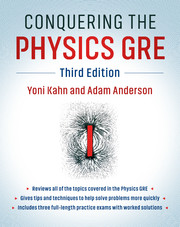Book contents
- Frontmatter
- Contents
- Preface
- How to Use This Book
- Resources
- 1 Classical Mechanics
- 2 Electricity and Magnetism
- 3 Optics and Waves
- 4 Thermodynamics and Statistical Mechanics
- 5 Quantum Mechanics and Atomic Physics
- 6 Special Relativity
- 7 Laboratory Methods
- 8 Specialized Topics
- 9 Special Tips and Tricks for the Physics GRE
- Sample Exams and Solutions
- References
- Equation Index
- Subject Index
- Problems Index
Resources
Published online by Cambridge University Press: 16 February 2018
- Frontmatter
- Contents
- Preface
- How to Use This Book
- Resources
- 1 Classical Mechanics
- 2 Electricity and Magnetism
- 3 Optics and Waves
- 4 Thermodynamics and Statistical Mechanics
- 5 Quantum Mechanics and Atomic Physics
- 6 Special Relativity
- 7 Laboratory Methods
- 8 Specialized Topics
- 9 Special Tips and Tricks for the Physics GRE
- Sample Exams and Solutions
- References
- Equation Index
- Subject Index
- Problems Index
Summary
Here we collect all the texts we recommend and will refer to in the review chapters. If you're wondering why books by Griffiths show up so often, it's likely because he was on the question-writing committee for the Physics GRE several years ago. Anecdotally, we know that questions are recycled very often (which is why so few exams have been released), so it's likely that many of the questions you'll see on your exam were written by Griffiths or consciously modeled after his books.
• Classical Mechanics: Whatever book you used for freshman physics should suffice here. For a more in-depth review of advanced topics, try Classical Dynamics of Particles and Systems by S.T. Thornton and J.B. Marion.
• Electricity and Magnetism: D.J. Griffiths, Introduction to Electrodynamics. This book covers everything you'll need to know about electricity and magnetism on the GRE, except for circuits. For circuits and a review of the most basic electricity andmagnetism problems, which Griffiths glosses over, consult any standard freshman physics textbook. A good treatment of electromagnetic waves can also be found in R.K. Wangsness, Electromagnetic Fields. E. Purcell, Electricity and Magnetism is an extremely elegant introduction emphasizing physical concepts rather than mathematical formalism, should you need to relearn the basics of any topic. Under no circumstances should you consult Jackson! It's far too advanced for anything you'll need for the GRE.
• Optics and Waves: Like classical mechanics, nearly all the relevant information is covered in your freshman physics textbook. Anything you're missing can be found in the relevant chapters of Introduction to Electrodynamics by Griffiths.
• Thermodynamics and Statistical Mechanics: No overwhelming recommendation here. Thermal Physics and Elementary Statistical Physics by C. Kittel, or Fundamentals of Statistical and Thermal Physics by F. Reif, are decent. Statistical Physics, by F. Mandl has some decent pedagogy and the nice feature of many problems with worked solutions. Fermi's Thermodynamics is a classic for the most basic aspects of the subject.
Information
- Type
- Chapter
- Information
- Conquering the Physics GRE , pp. xii - xivPublisher: Cambridge University PressPrint publication year: 2018
